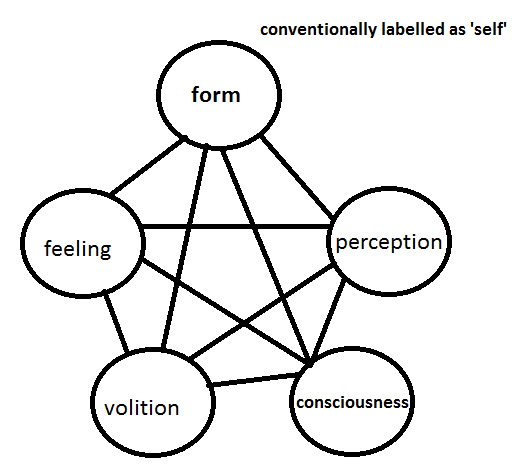The Buddha rejected the extremes of eternalism and nihilism and taught the middle way which is free from extremes. This post examines what each of these mean with pictorial aid.
Water
Eternalism
There is a water. Water truly exists. Hydrogen and oxygen are attributes of the water.
Nihilism
The water does not exist. OR The water that exists now annihilates later.
Middle Way
Co-dependently arisen hydrogen and oxygen are empty of water, but is conventionally called water. Hydrogen and oxygen are not attributes of an entity "water" (no such thing can be pinned down), not contained by an entity called "water", nor is there a "water" that is "made up of" hydrogen and oxygen. Rather, two hydrogen and one oxygen atoms co-dependently arising ARE what is conventionally imputed as water.
Self
Eternalism
Self view is the held position that there is a self. Self truly exists. Self may be seen as attributeless (as some attributeless pure consciousness as in advaita), or a self that owns or contains attributes, or an agent that manifests, owns, observes, or controls, its aggregates. The precise view of self varies from eternal, partially eternal, to nihilistic (for a lengthy discourse by Buddha on the numerous "thicket of views", refer to http://www.accesstoinsight.org/tipitaka/dn/dn.01.0.bodh.html). From an eternalist perspective, the self remains unchanged despite the changes in life. It remains unchanged even after bodily death. It is either seen as the unchanging self [as an individual soul], or the Self [as an infinite Self or Presence] that is unaffected by the passing aggregates or phenomena.
Nihilism
The self does not exist. OR The self in this life annihilates upon death. There is no karma, cause and effect, or rebirth.
Middle Way
Co-dependently arisen five aggregates are empty of self, but is conventionally called self. Seeing is not a self seeing, but is simply the experience being seen. Volition is not via a doer, but is simply action-activity-process, co-dependently arisen. Consciousness is not a self, it is simply auditory consciousness manifested dependent on ear, sound and attention, so on and so forth. Taste of chocolate has nothing to do with a taster but is simply the process or seamless activity of biting, tongue touching chocolate, consciousness of taste, etc. Ultimately, whatever dependently originates is also empty of any true existence (five aggregates are also empty) - but appearances are not denied.
Now replace "water" or "self" with anything - mind, matter, Buddha-nature, Truth, awareness, cars, houses, atoms, universe, etc. All applies the same way.
Diamond Sutra: "Subhuti, all dharmas are spoken of as no dharmas. Therefore they are called dharmas."
Anuradha Sutta: "And so, Anuradha — when you can't pin down the Tathagata as a truth or reality even in the present life — is it proper for you to declare, 'Friends, the Tathagata — the supreme man, the superlative man, attainer of the superlative attainment — being described, is described otherwise than with these four positions: The Tathagata exists after death, does not exist after death, both does & does not exist after death, neither exists nor does not exist after death'?"
Ted Biringer: "...According to Dogen, this “oceanic-body” does not contain the myriad forms, nor is it made up of myriad forms – it is the myriad forms themselves. The same instruction is provided at the beginning of Shobogenzo, Gabyo (pictured rice-cakes) where, he asserts that, “as all Buddhas are enlightenment” (sho, or honsho), so too, “all dharmas are enlightenment” which he says does not mean they are simply “one” nature or mind."
Thusness (2008): The key is in "emptiness" so that there is complete non abiding and (non-)staying (thus avoiding eternalism) and "luminosity" so that there is aliveness and clarity without falling into nihilism.
Note: does that mean that conventionally self truly exists? No. Conventional truths are not in fact true nor existing but are merely deluded projections as a result of ignorance. Five aggregates are deludedly conceived as a self. Such a self may conventionally be considered true, yet there is actually no truth to it. It is merely a false name used by the enlightened for pragmatic purpose, but taken to be true and existing by the ignorant. Nagarjuna: "Since the Jina proclaims that nirvana alone is true, what wise person would not reject the rest as false?"
The diagrams are inspired by Julian Baggini's speech on Ted talk: http://awakeningtoreality.blogspot.sg/2012/05/is-there-you.html





